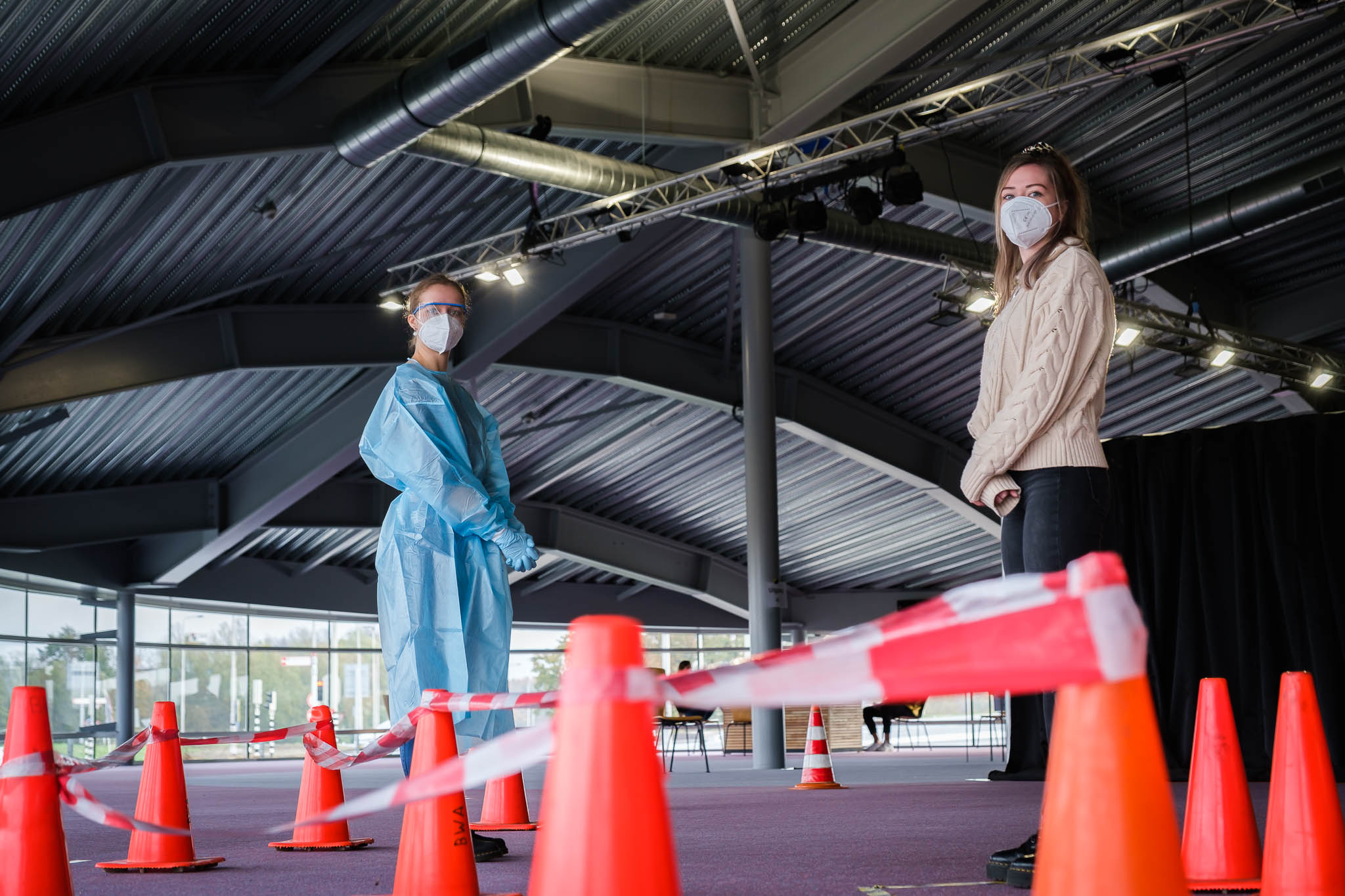230,000 coronavirus tests are done every week in the Netherlands. A massive task, which requires a lot of workers. Many of the testers are students. We talked to two WUR students about this unusual part-time job.
Merle Kuiper is doing the MSc in Nutrition and Health, and since September she has been combining that with a job at a testing station. ‘Normally I work in a café at Ouwehands Zoo. That closed in March so I started looking for something else and I wanted to help out during the coronavirus crisis. Then an email came in from WURkforce (WUR’s vacancy list, ed.) saying the health service was looking for people. I thought that might be an idea.’ Myrthe Bouma (doing the BSc in Forest and Nature Management) decided to respond to the appeal from WURkforce too. ‘I’m in my fourth year of my Bachelor’s because I still have a few courses to do. In between those courses I’ve got lots of time to work, and I’ve been a tester for a month now.’
I tell people to sit on their hands
For those who haven’t yet undergone a Covid test, this is the procedure in brief: When you come in, you say your name, show your ID and are registered in the computer system. That’s the administrative part of the procedure, which is what Merle does. Then you take a seat and the tester –swathed from top to toe in protective clothing, face mask and goggles – will take the sample from your throat and nose using a cotton bud. That is Myrthe’s job. The sample goes into a tube that is linked to your name and is sent to the lab, where they see whether you have the coronavirus.
Work carefully
It only takes a couple of minutes, but it’s a very important task. Myrthe: ‘You have to work carefully, you mustn’t make any mistakes. You don’t want to be the one who labelled a tube wrongly or lost a test. If that happens, the person has to come back and be tested again. It’s even worse it you carry out the test wrongly, because that can give a “false negative”. That means someone goes on walking around thinking they are fine, while they are not. Someone like that could infect a lot of other people.’ The students are not afraid they’ll get sick themselves. Merle: ‘We are well protected. I’m sitting behind a plexiglass screen and I always wear a face mask. And we disinfect everything people touch.’
I would rather see the virus figures go down, even if that does cost me my job
To do the test properly you have to push the cotton bud right up people’s noses. That is what makes a lot of people nervous about being tested. It’s nerve-racking for the tester the first time, too. ‘You get good training and plenty of time to observe a colleague. And it’s not very difficult. Even so, my hands were trembling the first time I did it.’
Sit on your hands
It has become routine by now, although that’s not the case for the ‘client’ of course. How do you deal with anxious people? Merle: ‘You try to reassure people, crack a joke. When I started, I got a colleague to test me so I knew what it felt like. You can’t go telling everyone it’s not too bad if you haven’t gone through it yourself.’ Some people still react badly. Myrthe: ‘Sometimes people really shout at you, and I often nearly get thumped. It’s a kind of reflex when you start inserting the cotton bud. If that happens, I quickly stop and step back, and tell people to sit on their hands. That works. Other people get so anxious they start hyperventilating. Or they are worried that their DNA will be kept for dubious purposes. Some of them look at me suspiciously and ask, are you going to do my test? Children are easier. They are scared too, but they just submit to it. Children have an unshakeable faith in people who look like medics.’
Difficult moments
‘The test result has serious consequences for some people,’ says Merle. ‘If they test positive for Covid they can’t go on holiday, or to a funeral, or to visit their family. Emotions can run high. Normally you would put your arm around someone in that situation, and now you have to try and comfort them from behind plexiglass. Moments like that are difficult.’
Luckily, most of the interaction is nice. ‘Now the whole testing process is more efficient, we mainly get positive feedback. People are happy and grateful that they are tested quickly.’ Myrthe: ‘It is really nice work; I wouldn’t mind doing it for a while longer. But it depends how the pandemic develops. I would rather see the virus figures go down, even if that does cost me my job.’

 WUR students Myrthe Bouma (left) and Merle Kuiper work at the coronavirus testing station in the cinema in Ede. Photo: Guy Ackermans
WUR students Myrthe Bouma (left) and Merle Kuiper work at the coronavirus testing station in the cinema in Ede. Photo: Guy Ackermans